|
|
|
Sort Order |
|
|
|
Items / Page
|
|
|
|
|
|
|
| Srl | Item |
| 1 |
ID:
086905
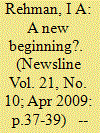

|
|
|
|
|
| Publication |
2009.
|
| Summary/Abstract |
The organisers of the lawyers' movement for the restoration and independence of the judiciary, could not have been accused of niggardliness in promising rewards to the people. From an end to police excesses and loadshedding to the elimination of corruption, unemployment and poverty, the wishlist had a cure for every major social affliction.
But as time passes, the public will discover the virtues of realism and learn to absorb the shocks of disappointment. Except for their expectations of a radical improvement in the justice system in terms that have a meaning for ordinary citizens, especially the poor and the marginalised, the other promises may well remain unfulfilled.
|
|
|
|
|
|
|
|
|
|
|
|
|
|
|
|
| 2 |
ID:
119980
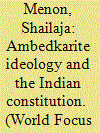

|
|
|
| 3 |
ID:
132533


|
|
|
|
|
| Publication |
2014.
|
| Summary/Abstract |
The rapid manner in which social protection systems have gained prominence and political support in development and poverty reduction discourse over the past few years is practically without precedent, leading some to consider it "a quiet revolution." Latin American countries have been at the forefront of this "revolution," with political support for government-funded social protection mechanisms going hand in hand with a growing discourse in favor of a human rights approach in development agendas. This approach is in line with the constitutions of most Latin American countries (including Argentina, Bolivia, Ecuador, Colombia, Guatemala, and Brazil), which enshrine a long list of human rights and explicitly recognize that these norms impose limits on state power. This constitutional protection of rights includes not only civil and political rights, but a wide range of economic, social, and cultural rights (see e.g. the constitutions of Colombia, Brazil, and Costa Rica), the prohibition of discrimination (on the grounds of gender, age, ethnicity, disability, sexual orientation, health status, and others), and the obligation to take affirmative action to protect groups that have suffered from structural discrimination (see e.g. constitution of Ecuador).
|
|
|
|
|
|
|
|
|
|
|
|
|
|
|
|
| 4 |
ID:
083690
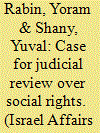

|
|
|
| 5 |
ID:
131659
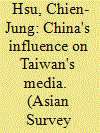

|
|
|
|
|
| Publication |
2014.
|
| Summary/Abstract |
The warming cross-Taiwan Strait relationship has allowed China greater opportunities to influence Taiwan's media. Three interrelated strategies-greater economic control over media outlets, pressure exerted on media owners, and the purchase of influential advertisements-have led to growing concerns about the erosion of press freedoms in Taiwan.
|
|
|
|
|
|
|
|
|
|
|
|
|
|
|
|
| 6 |
ID:
117493
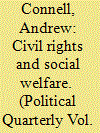

|
|
|
|
|
| Publication |
2012.
|
| Summary/Abstract |
This article draws on T H Marshall's celebrated classification of civil, political and social rights to examine the use of the courts by individuals seeking to establish rights to particular forms or models of welfare service provision. It argues that tensions between the collective and individual aspects of social rights, the relationship of social rights to inequality, and the difficulty of quantifying (and therefore enforcing) legitimate expectations, all make the use of litigation to establish social rights intensely problematic. Drawing on the recent UK Supreme Court case of R (on the Application of McDonald) v Royal Borough of Kensington and Chelsea, it goes on to suggest that it is unhelpful to think of social rights in terms of human rights: instead, we would do better to adopt Marshall's emphasis on the citizenship basis of social rights and on the social and political context within which they necessarily exist.
|
|
|
|
|
|
|
|
|
|
|
|
|
|
|
|
| 7 |
ID:
127769
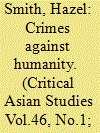

|
|
|
|
|
| Publication |
2014.
|
| Summary/Abstract |
The United Nations Human Rights Council (UNHRC) Commission of Inquiry, established in 2013 to investigate human rights violations in North Korea, identified food rights violations, among other abuses, as potentially constituting crimes against humanity. A contradiction arises in that UNHRC claims of food rights violations in the DPRK are not congruent with the statistical indicators emanating from the UN humanitarian and development agencies that have worked in the DPRK since the mid 1990s and that have engaged in and published substantial research on food, nutrition, and health. The author of this article contends that North Korea has an oppressive government and argues that the lack of transparency makes the many things that are unknown about North Korea, especially its opaque penal system, of legitimate ethical and political concern. Reasonably good data on issues pertaining to social and economic rights do exist, however, as this article shows. The inconsistency between the received wisdom on food and nutrition is of concern because the potential consequences of a state being judged as committing crimes against humanity include military intervention and consequent threats to life for millions. This article reconsiders how and why the received wisdom becomes unchallenged and unchallengeable in scholarly, policy, and media discourse. Inconsistency and misrepresentation is not primarily due to conscious bias but much more because of the unconscious adoption of a securitized perspective through which knowledge about North Korea is filtered. The article argues for reframing North Korean human rights issues on the basis that North Korean society is neither unique nor unknowable.
|
|
|
|
|
|
|
|
|
|
|
|
|
|
|
|
| 8 |
ID:
168741
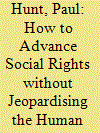

|
|
|
|
|
| Summary/Abstract |
When the 1948 Universal Declaration of Human Rights (UDHR) was drafted, governments grasped that human rights are needed as safeguards, not only against authoritarianism but also against the causes of authoritarianism. For this reason, the UDHR encompasses civil, political, economic, social and cultural rights. This holistic vision of human rights was obscured during the Cold War and more recently by economic neo‐liberalism. The UK government neglects social rights, which have a very low public profile, although there is evidence that the profile of these human rights is increasing. UK domestic law and practice is inconsistent with the holistic vision of human rights and the government's binding international social rights obligations. The UN Special Rapporteur on extreme poverty and human rights recommends that the UK provides for ‘the legislative recognition of social rights’ which can be approached in various ways. One way is to proceed social right by social right (for example, the rights to housing, health and education), and sector by sector (for example, the sectors of housing, health and education). This administrative law approach advances explicit social rights without implicating or jeopardising the Human Rights Act 1998.
|
|
|
|
|
|
|
|
|
|
|
|
|
|
|
|
| 9 |
ID:
127588
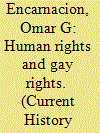

|
|
|
|
|
| Publication |
2014.
|
| Summary/Abstract |
When, many years from now, historians undertake to determine the watershed moments in the evolution of the international human rights movement, they likely will single out for attention the June 2011 United Nations Human Rights Council (UNHRC) resolution affirming that "gay rights are human rights." A simple fact underscores the resolution's momentousness: It has become common to think of gay rights and human rights as closely intertwined, yet the 1948 Universal Declaration of Human Rights-which asserted that human rights are inalienable rights that a person is entitled to simply because he or she is a human-made no mention of sexual identity, even as it addressed a wide range of rights, such as the right to work, housing, education, association, religion, and even leisure. So how did this commingling of human rights and gay rights come about, and what does it say about the future of both movements?
|
|
|
|
|
|
|
|
|
|
|
|
|
|
|
|
| 10 |
ID:
107646
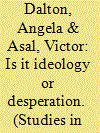

|
|
|
|
|
| Publication |
2011.
|
| Summary/Abstract |
Why do some terrorist organizations deploy women on the front lines and in violent attacks? This study explores the social conditions, economic factors, and organizational characteristics that might explain women's participation in violent terrorist activity. With a new data set of 395 terrorist organizations, women's participation in terrorist attacks was quantified and coded. The logistic regression analysis results suggest that women's educational attainment, social rights, terrorist organization's age and size, and the level of a country's economic development are important predictors of the deployment of women in terrorist violence while a terrorist group's ideological or religious orientation and the level of democracy do not significantly influence the likelihood of women's participation.
|
|
|
|
|
|
|
|
|
|
|
|
|
|
|
|
| 11 |
ID:
132975
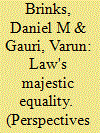

|
|
|
|
|
| Publication |
2014.
|
| Summary/Abstract |
While many find cause for optimism about the use of law and rights for progressive ends, the academic literature has long been skeptical that courts favor the poor. We show that, with the move toward a robust "new constitutionalism" of social and economic rights, the assumptions underlying the skepticism do not always hold. Our theories must account for variation in the elite bias of law and litigation. In particular, we need to pay closer attention to the broad, collective effects of legal mobilization, rather than focusing narrowly on the litigants and the direct benefits they receive. We support the claim by showing that litigation pursued in legal contexts that create the expectation of collective effects is more likely to avoid the potential anti-poor bias of courts. On the other hand, policy areas dominated by individual litigation and individualized effects are more likely to experience regressive outcomes. Using data on social and economic rights cases in four countries, we estimate the potential pro-poor impact of litigation by examining whether the poor are over- or under-represented among the beneficiaries of litigation. We find that the impact of courts is positive and very much pro-poor in India and South Africa, and slightly negative in Indonesia and Brazil. Overall, we challenge the tendency in the literature to focus on the direct effects of litigation, find that the results of litigation are more positive for the poor than the conventional wisdom would lead us to expect, and offer an explanation that accounts for part of the variation while raising a number of questions for future research.
|
|
|
|
|
|
|
|
|
|
|
|
|
|
|
|
| 12 |
ID:
139220
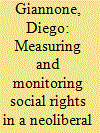

|
|
|
|
|
| Summary/Abstract |
The article aims to describe how the measurement and monitoring of human rights have been changed and weakened by the neoliberal resistance to social rights. In so doing, the study describes the political and ideological context which stimulated the broad conception of human rights included in the Universal Declaration of Human Rights. It then focuses on the ideological turn which occurred over the 1970s from welfare democracy to neoliberal democracy and the neoliberal approach to human rights. Based on a neo-Gramscian approach, the study considers political and ideological reasons as key in explaining both the rise and fall of social rights and the changes in their measurement. As a case in point, the article analyses the work of the UN in measuring and monitoring human rights. In spite of the use by the UN committees of indicators and guidelines aimed at measuring and monitoring the progressive realization of all human rights, results show that the reluctance of many states to implement social and economic rights makes UN efforts ineffective. Both states’ reluctance and instruments’ ineffectiveness can be ascribed to the neoliberal delegitimization of social rights, which is likely to persist in spite of the recent economic crisis.
|
|
|
|
|
|
|
|
|
|
|
|
|
|
|
|
| 13 |
ID:
134220


|
|
|
|
|
| Publication |
2014.
|
| Summary/Abstract |
In the wake of the Arab Revolutions of 2011, countries in the Middle East are grappling with how Islamists might be included within a regime of democratic political pluralism and how their aspirations for an "Islamic state" could affect the citizenship status of non-Muslims. While Islamic jurisprudence on this issue has traditionally classified non-Muslims in Islamic society as protected peoples or dhimma, endowed with what the authors term "minority citizenship", this article will examine how the transnational intellectual Wasa?iyya or Centrist movement, of which Sheikh Yusuf al-Qaradawi is the figurehead, have sought to develop a new fiqh of citizenship in which Muslims and non-Muslims have equal civil and political rights. This article will focus on Yusuf al-Qaradawi on the basis that his very recent shift in 2010 on the issue is yet to be studied in depth, as well as in view of the fact that the dilemma faced by reformist Islamic scholars-how to integrate modern concepts into a legal tradition while simultaneously arguing for that tradition's continuing relevance and authority-is for him rendered particularly acute, given that this tradition is itself the very source of his own authority and relevance. It will therefore be argued that the legacy of the Islamic legal tradition structures his discourse in a very specific way, thereby having the potential to render it more persuasive to his audience, and worthy of a more detailed examination.
|
|
|
|
|
|
|
|
|
|
|
|
|
|
|
|
| 14 |
ID:
075501
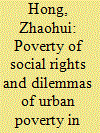

|
|
|
|
|
| Publication |
2005.
|
| Summary/Abstract |
This article, drawing references from popular theories of social exclusion, capability and civil rights, develops a concept-the poverty of social rights-in the causal analysis of poverty. The author believes that deficiency of economic resources and working capability are not the only reasons for urban poverty; in fact, the lack of social rights on the part of the disadvantaged sectors of society constitutes simultaneously the cause and consequence of urban poverty. The article defines the concept of poverty of social rights and its characteristics, and analyzes its China phenomenon. In the end the article poses several options and remedies for China's poverty-relief efforts through designing and implementing a Chinese-style affirmative action.
|
|
|
|
|
|
|
|
|
|
|
|
|
|
|
|
| 15 |
ID:
149051
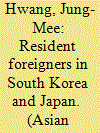

|
|
|
|
|
| Summary/Abstract |
Although South Korea and Japan tend to maintain their identity as nonimmigration countries, a policy agenda for foreign residents has incrementally emerged, especially since the 1990s. In this comparative analysis, I examine the status of permanent and long-term residents and relevant policy changes that enhance their social and political rights regardless of naturalization. Permanent residents in Japan can access social welfare benefits such as the national pension, public assistance, and child allowances, but they are excluded from local suffrage. In contrast, permanent residents of South Korea have political rights in local elections while welfare coverage for them is restricted to public insurance, with no public aid entitlement. This difference represents a policy gap, caused by inconsistencies in the process of policy revisions and different priorities in policymaking.
|
|
|
|
|
|
|
|
|
|
|
|
|
|
|
|
| 16 |
ID:
129423
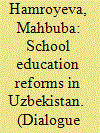

|
|
|
|
|
| Publication |
2014.
|
| Summary/Abstract |
After gaining independence, Uzbekistan created favourable conditions for development of education. Legal framework for working out a national education policy was the imperative of the day. Only on the
basis of a strong cadre policy could the country look forward to development and choose its own path. Adoption of the Constitution of the Republic of Uzbekistan was the first step in this direction that guaranteed all citizens the right to education. It provided that the State shall guarantee free secondary education to all children. Schooling is under the State control.1 Subsequent reforms were undertaken in a
phased manner and these reforms have helped in improving the structure and content of education. This paper deals exclusively with the school education at a time when the country transited from decadent Soviet system to a new system of school education.
|
|
|
|
|
|
|
|
|
|
|
|
|
|
|
|
|
|
|
|
|